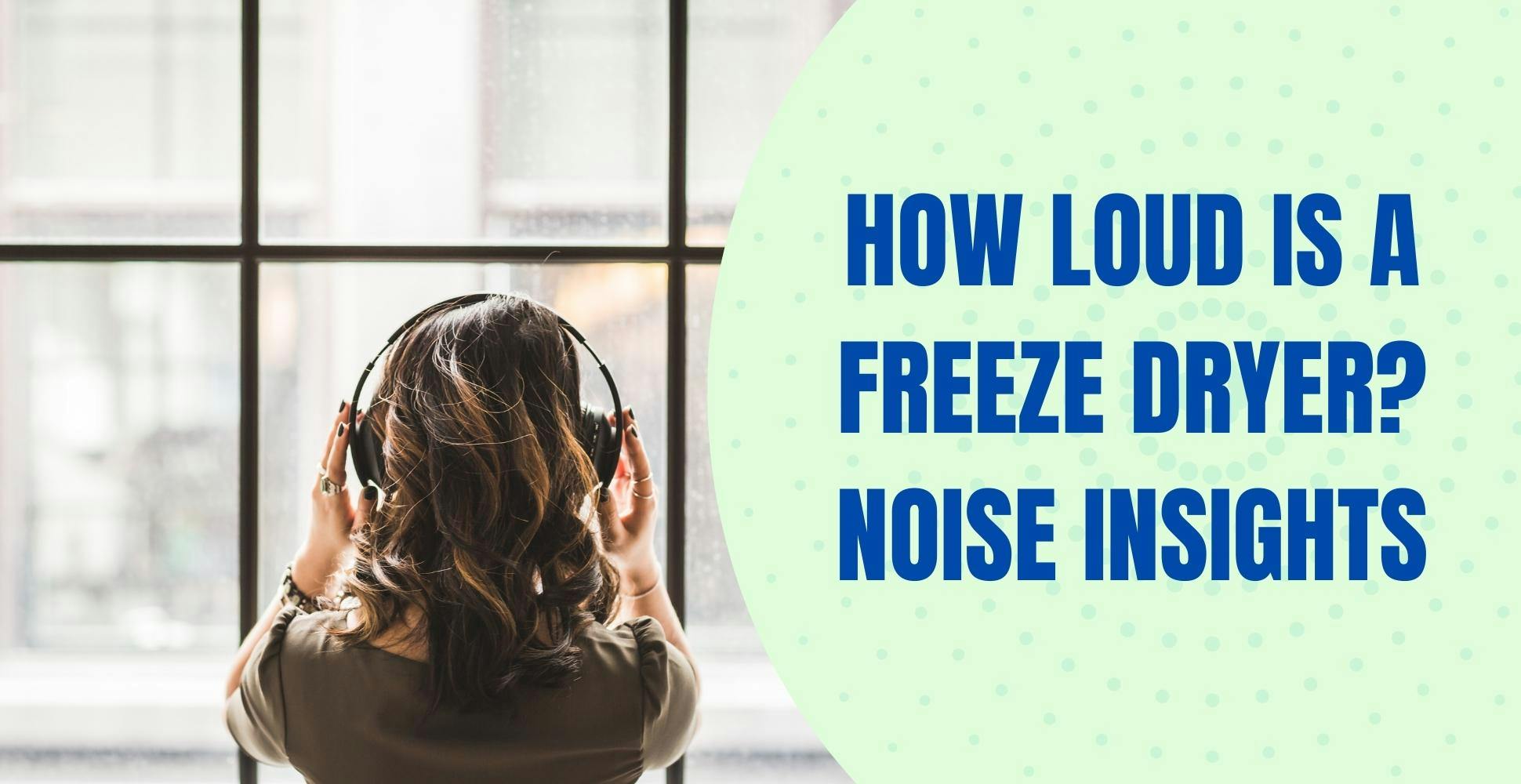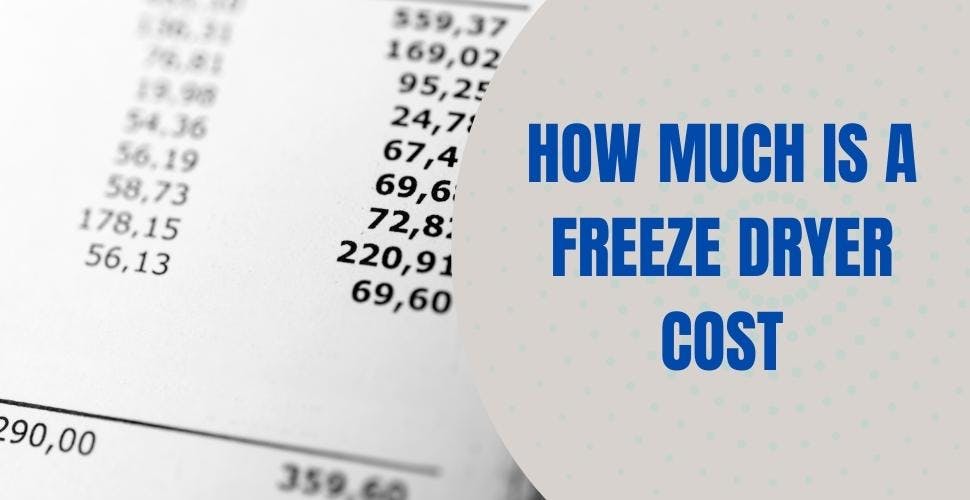How Loud is a Freeze Dryer
 Dr. Tontul
Dr. Tontul- 21 Aug 2023

Understanding Freeze Dryers: A Brief Overview
Before we examine how loud is a freeze dryer, let's better understand what they are and how they work.
A freeze dryer, also known as a lyophilizer, is a device used to remove moisture from materials through a process called freeze drying or lyophilization.
This process involves freezing the material and then subjecting it to a vacuum environment, which allows the frozen water in the material to sublimate directly from ice to vapor without passing through the liquid phase. The result is a dried material that retains its original structure and properties.
A freeze dryer requires a vacuum pump and an ice condenser to perform this process, which can be noisy depending on the model and design.
How Loud is a Freeze Dryer?
Decibels (dB) are used to measure the intensity of sound. The decibel scale is logarithmic, meaning a small increase in decibels represents a significant increase in sound intensity. For reference, a whisper might be around 20 dB, while a jet engine near takeoff can reach 140 dB.
When assessing the noise produced by a freeze dryer, it's important to understand the decibel scale:
- Normal Conversation: Approximately 60 dB
- Vacuum Cleaner: Around 70-80 dB
- City Traffic: About 85 dB
Freeze dryers generally operate in the 60 to 70 decibel range, depending on their design, size and other factors. It is important to remember that noise perception is subjective and what may be loud for one person may be tolerable for another.
Although a difference of 10 decibels may not seem like much, the decibel scale is actually logarithmic, meaning that 70 dB is ten times 60 dB. It is therefore necessary to make a special room for the freeze dryer for individuals who are disturbed by noise and keep it behind closed doors.
The Factors that Contribute to Noise Levels
When assessing the noise produced by a freeze dryer, several factors come into play. These factors collectively contribute to the overall noise level generated by the freeze dryer machine:
1. Compressor Noise
The compressor is a crucial component of a freeze dryer, responsible for maintaining the low temperature needed for the freezing phase and water vapor condensation.
Compressors can emit noise during their operation, which varies depending on the type and quality of the compressor used. Modern freeze dryers often incorporate noise-reduction technologies to mitigate compressor noise.
2. Vacuum Pump Noise
During the sublimation phase of freeze-drying, a vacuum pump is employed to create a low-pressure environment that facilitates the transition of ice to vapor. The vacuum pump can introduce a certain level of noise, with the noise intensity being influenced by the pump's design, size, and efficiency.
In general, oil-less vacuum pumps are noisier than oil vacuum pumps. However, oil vacuum pumps require more frequent maintenance. If maintenance is delayed or not performed, the noise of the pump increases.
3. Mechanical Vibrations
The mechanical components of a freeze dryer, including fans, motors, and heating elements, can produce vibrations as they operate. These vibrations can contribute to the overall noise output of the machine. Manufacturers may employ damping materials and engineering techniques to minimize vibrations and subsequent noise.
Factors Affecting Freeze Dryer Noise Levels
-
Compressor Type and Size: The type and size of the compressor play a crucial role in determining noise levels. Scroll compressors and variable-speed compressors tend to produce less noise compared to reciprocating compressors due to their smoother operation.
-
Cooling System: The cooling system of a freeze dryer also contributes to noise levels. Units with well-insulated compressors and fans designed for quiet operation tend to produce lower noise.
-
Vacuum pump type and size: Freeze dryer manufacturers offer different vacuum pumps. Oil-free vacuum pumps are preferred by many due to their lower maintenance requirements. However, oil-free vacuum pumps are noisier..
In addition, a vacuum pump suitable for the chamber of the freeze dryer should be preferred to reduce the noise level.
-
Construction and Design: The overall construction and design of the freeze dryer impact noise levels. Models with vibration-reducing features and noise-dampening materials tend to be quieter.
-
Operating Environment: The location where you place your freeze dryer matters. A well-ventilated, isolated space can help contain noise. Conversely, placing it in a confined or noisy area might amplify the sound.
To avoid the noise of a freeze dryer, many people keep theirs in spare rooms such as a laundry room, a storage room, or a spare bedroom.
Managing Freeze Dryer Noise
To minimize the impact of freeze dryer noise, consider the following tips:
-
Proper Placement: Choose a location for your freeze dryer that minimizes noise disruption to occupants while ensuring adequate ventilation.
-
Soundproofing: If noise reduction is a primary concern, you can invest in soundproofing materials or enclosures designed to absorb and dampen noise. When soundproofing your freeze dryer, ensure proper ventilation to prevent overheating and follow manufacturer guidelines to avoid compromising its performance.
-
Operational Timings: Schedule freeze drying cycles during periods when noise sensitivity is lower, such as evenings or weekends.
FAQ
Can I perform maintenance to reduce noise levels?
Yes, regular maintenance, such as cleaning vents, lubricating moving parts, and ensuring proper insulation, can help maintain optimal noise levels.
Do noise levels vary between home-use and industrial freeze dryers?
Yes, industrial-scale freeze dryers are likely to produce higher noise levels due to their larger size and higher capacity.
How loud is a harvest right freeze dryer
According to the producer the home freeze dryer runs at about 65 decibels. It is a bit louder at the beginning of the process but getting better after a while.
What Does it Mean When the Usual Freeze Dryer Noises Change?
Other than the usual difference between the quiet hum of the freezer and louder pump noise (as well as the beep that lets you know the process is finished), changes to the noises of the freeze dryer can be indications that something is wrong with your appliance.
In general, if you suspect that your freeze dryer isn’t working properly you should inspect the sealed parts, as the most likely fault is in the vacuum seal.
Conclusion
Freeze dryers are effective systems for preserving materials while removing moisture. Although they can be noisy during operation, advances in technology are constantly striving to create quieter and more efficient freeze dryers.
As with any technology, the noise produced by a freeze dryer depends on various factors such as compressor and vacuum pump design, insulation and vibration management.
As you explore the world of freeze dryers, remember that perceived loudness can be subjective and manufacturers are actively working towards quieter solutions.
Discover Advantages and Disadvantages of freeze drying.


